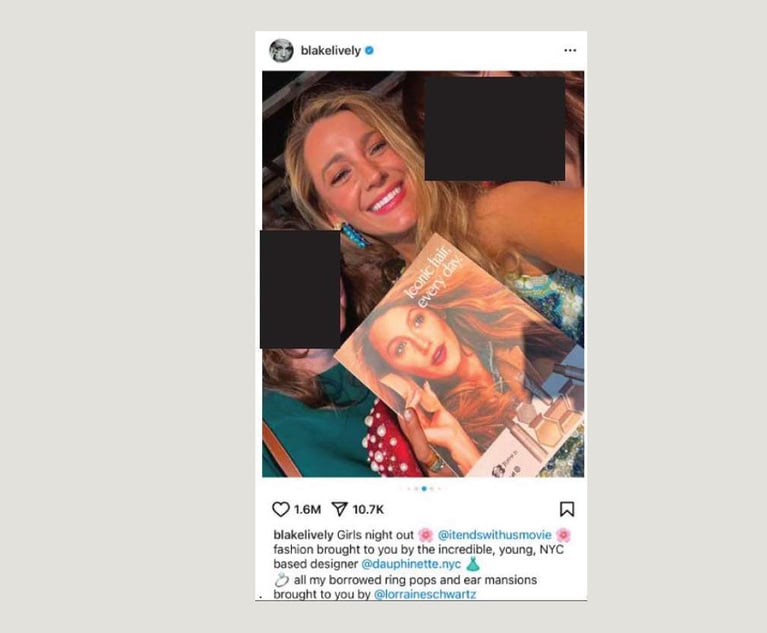US Soccer Brings in Latham After Arguing Women Players Are Less Skilled Than Men
The organization faced a barrage of criticism after its lawyers at Seyfarth Shaw wrote that players on the U.S. Women's National Team "do not perform equal work requiring equal skill, effort, and responsibility under similar working conditions."
March 12, 2020 at 12:04 PM
5 minute read
 U.S. Women's National Soccer Team forward Megan Rapinoe (#15) in action during friendly game against Mexico as preparation for 2019 Women's World Cup in Harrison, New Jersey. (Shutterstock.com)
U.S. Women's National Soccer Team forward Megan Rapinoe (#15) in action during friendly game against Mexico as preparation for 2019 Women's World Cup in Harrison, New Jersey. (Shutterstock.com)
The president of the U.S. Soccer Federation on Wednesday announced it was bringing on Latham & Watkins after the group and its lawyers at Seyfarth Shaw argued in federal court that the U.S. Women's National Team has less "skill" than the men's team.
But at this point, it's unclear whether U.S. Soccer's decision to hire Latham means the federation will fire Seyfarth or the two firms will work together to push back again the class action claims made by female U.S. Soccer players, who have alleged the federation discriminates against them by paying players on the men's team more money.
In a statement apologizing for U.S. Soccer's motion—which was filed in response to the women's team's motion for summary judgment—federation president Carlos Cordeiro said the group is "making immediate changes."
"I have asked the firm of Latham & Watkins to join and guide our legal strategy going forward," Cordeiro said. "I have made it clear to our legal team that, even as we debate facts and figures in the course of this case, we must do so with the utmost respect not only for our women's national team players but for all female athletes around the world. As we do, we will continue to work to resolve this suit in the best interest of everyone involved."
As of press time, there have been no withdrawal or appearance filings in the case docket for the U.S. District Court for the Central District of California. A spokesman for Seyfarth declined to comment; spokesmen for Latham and U.S. Soccer did not respond to requests for comment as of press time.
While being represented by Seyfarth, U.S. Soccer argued the women's team does not have a claim under the Equal Pay Act because the men and women's team "do not perform equal work requiring equal skill, effort, and responsibility under similar working conditions."
"Plaintiffs ask the court to conclude that the ability required of an WNT player is equal to the ability required of an MNT player, as a relative matter, by ignoring the materially higher level of speed and strength required to perform the job of an MNT player," the federation argued.
U.S. Soccer pointed to statements made by the women's players, who were quoted by the federation as saying the women's national team could not compete against men's teams because they are stronger and faster.
"Nor is it a 'sexist stereotype' to recognize the different levels of speed and strength required for the two jobs, as plaintiffs' counsel contend. On the contrary, it is indisputable "science," as even plaintiff [Carli] Lloyd described it in her testimony," the federation argued.
The federation's filing—which attracted widespread criticism, including from sponsors such as Budweiser, Coca-Cola, Deloitte and Nike—was made on Monday, the day after International Women's Day.
The Seyfarth lawyers representing U.S. Soccer in the case include Chicago partners Ellen McLaughlin, Noah Finkel and Brian Stolzenbach, San Francisco partners Giovanna Ferrari and Chantelle Egan, and Atlanta partner Kyllan Kershaw. Stolzenbach signed the brief.
This isn't Latham's first time working with U.S. Soccer. Per the The New York Times in 2016, the firm represented the federation in contract negotiations with the women's team. The women's team alleged in their lawsuit that, while negotiating their current contract, U.S. Soccer "rejected requests for compensation for the WNT players that would have been at least equal to that afforded to the male MNT players."
Latham also represented U.S. Soccer when it successfully fought off an antitrust lawsuit from a sports management company in December.
In November, a federal judge certified the class action lawsuit the women's team filed against U.S. Soccer after finding the players on the Women's National Team were paid less per game than their male counterparts.
"This injury is concrete—the proposed class representatives were injured by defendant's compensation policy because they were in fact paid less on a per game basis than the [Men's National Team]," U.S. District Judge R. Gary Klausner wrote. "Indeed, plaintiffs have offered evidentiary proof that had they been paid on the same terms as the [Men's National Team], they would have earned more money per game and, as a result, more money per year over the course of the limitations period."
The Women's National Team, which has won four World Cups, is being represented by lawyers from Winston & Strawn.
Read More
Women's Soccer Players Win Class Certification in Unequal Pay Lawsuit
Women Soccer Players Push FIFA for Gender Pay Equity as World Cup Tourney Begins in France
Women's Soccer Gets Rematch in Court With Unequal Pay Class Action
This content has been archived. It is available through our partners, LexisNexis® and Bloomberg Law.
To view this content, please continue to their sites.
Not a Lexis Subscriber?
Subscribe Now
Not a Bloomberg Law Subscriber?
Subscribe Now
NOT FOR REPRINT
© 2025 ALM Global, LLC, All Rights Reserved. Request academic re-use from www.copyright.com. All other uses, submit a request to [email protected]. For more information visit Asset & Logo Licensing.
You Might Like
View All
Justin Baldoni Sues Blake Lively and Ryan Reynolds for $400M in New Step in 'It Ends With Us' Fight
6 minute read
Patreon Hit With Lawsuit for Allegedly Diverting Subscriber Data to Meta

Music App Denied Injunction Against Apple Over Alleged Scheme to Block Its Access to App Store

$15K Family Vacation Turned 'Colossal Nightmare': Lawsuit Filed Against Vail Ski Resorts
Law Firms Mentioned
Trending Stories
- 1'Didn't Notice Patient Wasn't Breathing': $13.7M Verdict Against Anesthesiologists
- 2'Astronomical' Interest Rates: $1B Settlement to Resolve Allegations of 'Predatory' Lending Cancels $534M in Small-Business Debts
- 3Senator Plans to Reintroduce Bill to Split 9th Circuit
- 4Law Firms Converge to Defend HIPAA Regulation
- 5Judge Denies Retrial Bid by Ex-U.S. Sen. Menendez Over Evidentiary Error
Who Got The Work
J. Brugh Lower of Gibbons has entered an appearance for industrial equipment supplier Devco Corporation in a pending trademark infringement lawsuit. The suit, accusing the defendant of selling knock-off Graco products, was filed Dec. 18 in New Jersey District Court by Rivkin Radler on behalf of Graco Inc. and Graco Minnesota. The case, assigned to U.S. District Judge Zahid N. Quraishi, is 3:24-cv-11294, Graco Inc. et al v. Devco Corporation.
Who Got The Work
Rebecca Maller-Stein and Kent A. Yalowitz of Arnold & Porter Kaye Scholer have entered their appearances for Hanaco Venture Capital and its executives, Lior Prosor and David Frankel, in a pending securities lawsuit. The action, filed on Dec. 24 in New York Southern District Court by Zell, Aron & Co. on behalf of Goldeneye Advisors, accuses the defendants of negligently and fraudulently managing the plaintiff's $1 million investment. The case, assigned to U.S. District Judge Vernon S. Broderick, is 1:24-cv-09918, Goldeneye Advisors, LLC v. Hanaco Venture Capital, Ltd. et al.
Who Got The Work
Attorneys from A&O Shearman has stepped in as defense counsel for Toronto-Dominion Bank and other defendants in a pending securities class action. The suit, filed Dec. 11 in New York Southern District Court by Bleichmar Fonti & Auld, accuses the defendants of concealing the bank's 'pervasive' deficiencies in regards to its compliance with the Bank Secrecy Act and the quality of its anti-money laundering controls. The case, assigned to U.S. District Judge Arun Subramanian, is 1:24-cv-09445, Gonzalez v. The Toronto-Dominion Bank et al.
Who Got The Work
Crown Castle International, a Pennsylvania company providing shared communications infrastructure, has turned to Luke D. Wolf of Gordon Rees Scully Mansukhani to fend off a pending breach-of-contract lawsuit. The court action, filed Nov. 25 in Michigan Eastern District Court by Hooper Hathaway PC on behalf of The Town Residences LLC, accuses Crown Castle of failing to transfer approximately $30,000 in utility payments from T-Mobile in breach of a roof-top lease and assignment agreement. The case, assigned to U.S. District Judge Susan K. Declercq, is 2:24-cv-13131, The Town Residences LLC v. T-Mobile US, Inc. et al.
Who Got The Work
Wilfred P. Coronato and Daniel M. Schwartz of McCarter & English have stepped in as defense counsel to Electrolux Home Products Inc. in a pending product liability lawsuit. The court action, filed Nov. 26 in New York Eastern District Court by Poulos Lopiccolo PC and Nagel Rice LLP on behalf of David Stern, alleges that the defendant's refrigerators’ drawers and shelving repeatedly break and fall apart within months after purchase. The case, assigned to U.S. District Judge Joan M. Azrack, is 2:24-cv-08204, Stern v. Electrolux Home Products, Inc.
Featured Firms
Law Offices of Gary Martin Hays & Associates, P.C.
(470) 294-1674
Law Offices of Mark E. Salomone
(857) 444-6468
Smith & Hassler
(713) 739-1250






